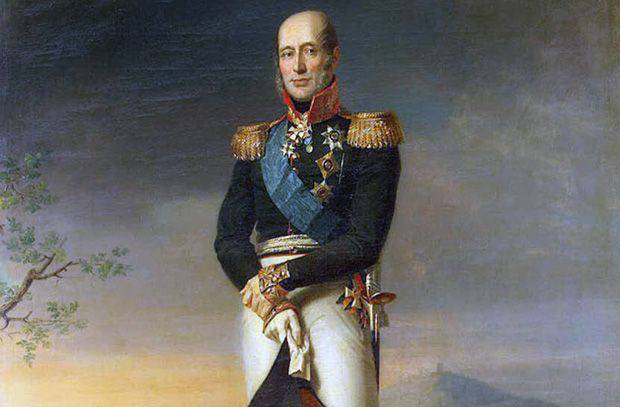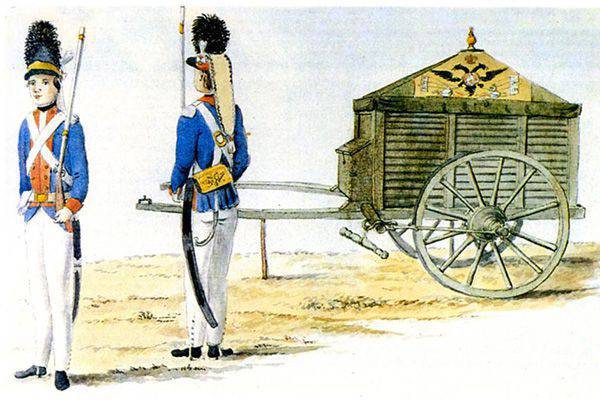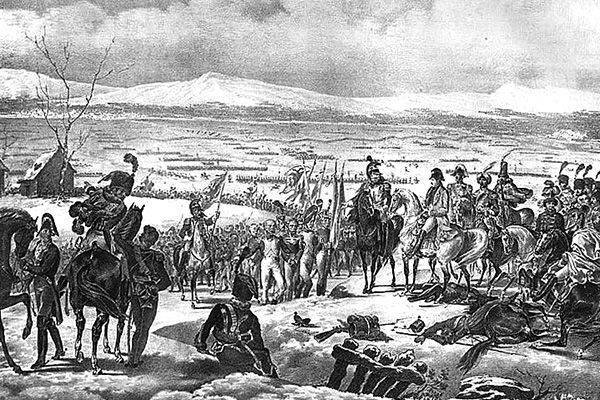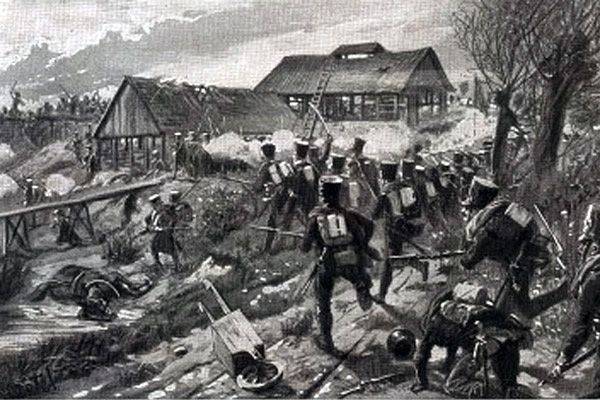Praised as a hero, praised as a traitor: Prince Barclay de Tolly

The creator of the "scorched earth" tactics and the ingenious Russian commander all his life was forced to put up with the unfair attitude of his contemporaries.
For all history The Russian Imperial Military Order of the Holy Great-Martyr and Victor the Conqueror George was only four holders of this highest military award of Russia. And two of them became its owners in the years of the Patriotic War 1812.
Both were called Michael. Both consistently led the Russian army in its most difficult opposition to the best army of Europe - the army of the French emperor Napoleon I. But one of them contemporaries deservedly deserved as the father of Borodino’s victory and organizer of the defeat of Napoleon’s troops, and the second contemporaries were completely undeservedly praised as a traitor and a talentless commander, admitted enemy to the walls of Moscow.
The first of the two was General Field Marshal, His Serene Highness Prince Mikhail Golenishchev-Kutuzov-Smolensky, the second General Field Marshal, Prince Mikhail Barclay de Tolly. It was he who was judged by the fate to first become in the eyes of society - not only light, but also her own army! - the culprit of the defeat of Russian troops in the first stage of the war, and then almost overnight turn into the savior of Europe and one of the greatest commanders of its time.
However, Michael Barclay de Tolly was not accustomed to such twists of fate. His whole life was subject to this not invented law: before you get a well-deserved reward, you need to endure a lot of undeserved consequences. Is it any wonder that the descendant of the Scottish freedom fighters brilliantly knew how to cope with the latter and took the first with dignity ...
Heir to the warlike Scots
The first in the family of Barclay de Tolly, who deserved the Russian nobility, was the grandfather of the future Field Marshal General - the Baltic German, a retired second-major of the Russian army, Wilhelm Barclay de Tolly. However, if he was a true master, since he was born and lived in Riga, like his ancestors, then the German was very conditional. After all, his name pointed to the origin of the Scottish clan Barclay, or Barkley, from that branch that lived in the town of Touvey, written as Towy, then as Towie, and even as Tolly. The last option and enshrined in writing the title of the brothers John and Peter Barclay de Tolly, in 1621, moved from the uncomfortable after the death of King Carl Stewart of Scotland in the free Hanseatic city of Rostock. And their descendants later reached Riga, where, according to the memoirs of Michael Barclay de Tolly himself, he was born in the 1761 year.
Little Mikhail, recorded in family ancestral books like Mikhail Andreas, was the second son among the four children of a retired lieutenant Weingold Gotthard, in Orthodoxy who adopted the name Bogdan (a direct translation of his second name). In the traditions of that time, perhaps, a path other than the military, to the sons of a retired officer, was probably not prepared. It is not surprising that all of them - the eldest Ivan, and the middle Mikhail, and the younger Andrei, went precisely for her. Ivan was promoted to the rank of engineer-major general, gained fame as a major military analyst and eventually became one of the main advisers for Brother Michael. Andrew did not vyusil prominent ranks, leaving the service in the rank of major. Michael also glorified the clan all over Russia and Europe.
Six year old corporal
However, it was possible to be proud of the sons of Gotthard-Bogdan except for his father's nobility - it did not give them any material benefits. All three began service with the lower ranks and for a long time were forced to languish in poverty, seeking fame and the accompanying material well-being. “Barclay de Tolly, before he was elevated to the ranks, had a state ... limited, ... even scanty, should have humble desires, constrain needs. Such a state, of course, does not hinder the aspiration of a noble soul, does not extinguish the high talents of the mind; but poverty ... gives ways to reveal them in the most decent form ... ", an outstanding military leader, General Alexei Yermolov, wrote in his Notes, during the 1812 war, the former chief of staff of the 1 Western Army commander Michael Barclay de Tolly.
"Humility of desires" was promoted by the fact that Michael from early childhood was forced to live as he was told, and not as he wanted. However, the same can be said about many of his contemporaries, but not all of them combined this need with poverty.
As a little boy, Mikhail left his native estate on the Pamushisev Livonia manor in 1765 and went to St. Petersburg, the family of the Augusta-Wilhelmina's native aunt, who was the wife of Georg Wilhelm von Vermeleen, colonel of the Kirasirsky Novotroitsk regiment. In this illustrious unit in 1767, as soon as my uncle became its commander, they recorded the boy as corporal. Almost immediately after this, the regiment commander left for the unit entrusted to him, stationed under Orel, and the young corporal continued to study the sciences befitting him in the capital under the supervision of a childless aunt who genuinely loved him.
Apparently, the training took place actively and efficiently, because after two years, Mikhail received the first promotion, becoming a superintendent. However, there is nothing particularly surprising here, because to master three languages - his native German, the usual Russian and indispensable for any educated person of that era French - the boy hardly needed any excessive efforts, and mathematics, which was an obligatory subject for everyone who dreams about military service, Michael was taught by famous mathematician Leonard Euler. As for military history, he comprehended it under the leadership of his uncle, who retired with the rank of general.
As a result, in 1776, 14-year-old Mikhail with a brilliant characteristic “He can read and write in Russian, German and French, knows fortification and knows mathematics” entered active military service in the Pskov Carabinier Regiment and two years later passed the exam on the first officer cornet.

On this fast promotion ended. The next rank — a lieutenant — he achieved only eight years later, and spent twenty to become a colonel. The reasons are the same as before: negligence, poverty and the fact that, as General Yermolov later recalled, “not belonging to the superiority of talents as extraordinary people, he unduly modestly appreciated his good abilities and therefore had no confidence in himself that could open paths that do not depend on the ordinary order ... awkward in the yard, did not attract people close to the sovereign; coldness in circulation did not earn the affection of equal, nor the commitment of subordinates ... "
From Orel to Ochakov
Nevertheless, from childhood he was accustomed to military order and discipline, understanding dedication and ability to obey orders as undoubted virtues, and in addition, as Yermolov wrote, “he used his free time for useful lessons and enriched himself with knowledge,” the young officer could not go unnoticed. And if the ranks bypassed him, then the promotion gave him a lot more: the necessary military experience.
During his early years of service, Mikhail managed to be an adjutant to such notable military leaders as Colonel Bogdan Knorring, who distinguished himself in the Russian-Turkish 1768 – 1774 campaign, and later from the first holder of the St. George 4 degree of General Gregory von Patkul, whose adyr in the Adygean Order of St. George 1783-nd degree General Gregory von Patkul, who had already joined the ranks of St. George’s XNUMX-degree of General Gregory von Patkul, and his associate — the yards; XNUMX, at the same time receiving the long-awaited title of second lieutenant. And three years later, being a lieutenant, the young de Tolly, on the recommendation of von Patkul, comes to work as an adjutant to Count Fyodor Anhalt, chief of the Finnish Chasseurs Corps. It is at this point that Barclay de Tolly, learning the basics of the headquarters service, first intersects with Mikhail Kutuzov, with whom his name will later be inextricably linked. But he does it in absentia: “Notes on the infantry service in general and about the chasseur’s especially” of the still major Major General Kutuzov are becoming one of the desk books of the young officer. Probably it was then that he adopted one of the rules that he adhered to throughout his entire future military career - to take care of his subordinates. In the Kutuzov Notes, it was formulated as follows: “The primary reason for the kindness and strength of any military corps is the maintenance of a soldier, and this subject should be considered the most important. Only by establishing the welfare of a soldier, you should think about preparing for a military position.
Two years later, and also on the recommendation of the commander, Barclay becomes adjutant to Lieutenant-General Prince Victor Amadeus of Anhalt-Bernburg-Schaumburg-Khojmsky, cousin of Fyodor Anhalt. With him, Captain Barclay de Tolly goes to the theater of military operations of the Russian-Turkish war 1787 – 1791. Under the walls of Ochakov, he received his baptism of fire and received the first significant award - the Ochakovsky Cross on the St. George Ribbon, one of the five military officer's awards, which marked those whose acts almost reached the award of the Order of St. George.
Chest in crosses. Georgievskys
However, this order produced in seconds-majors Barclay did not have to wait too long. But before that, he will have time to receive the Order of St. Vladimir 4 of the first degree for his first military campaign, meet Field Marshal Alexander Suvorov and Lieutenant-General Mikhail Kutuzov and in practice check all those theoretical tactical calculations that he built during his adjutant service. And in October, 1789, Barclay de Tolly, was assigned to Finland - instigated by his commander and patron Prince Victor Anhalt. It was there, on the fields of the next-to-last Russian-Swedish war, that he for the first time showed his full leadership talents, which, alas, were not able to see everything at that moment. One of the first to succeed was Lieutenant-General Anhalt: the ability of a subordinate struck him so deeply that, dying from a wound, he gave him his sword on his deathbed - a symbol of military and noble honor! - with which Michael Barclay de Tolly did not part until his death, and asked to be put with him in a coffin.
It happened on April 19 on 1790. Four years later, in September of the 1794, Prime Minister, battalion commander of the St. Petersburg Grenadier Regiment, Mikhail Barclay de Tolly received his first Order of St. George 4 class “For the excellent bravery shown against the Polish insurgents while mastering the fortifications and Vilno city.
The next order of St. George 3 degree Barclay deserved after thirteen years, in January 1807 year. By this time he was already in the rank of Major General and served as commander of the 3 regiment of chasseurs. The new regimental number was received six years before, in 1801, and earlier it was called 4. Before becoming famous in the war with Napoleon in 1806 – 1807, the regiment was known as the best in Finland in which justice, order, and discipline reign. This glory is quite deserved, and brought her first of all the efforts of the commander. As the historian Nikolai Kopylov writes, “the regimental commander Barclay personally went to the depot, where he himself selected recruits to the rangers. When the latter appeared in the regiment, he himself conducted initial training with them, trying to arouse pep and recruitment in the recruits. Any abuse and insults to the recruits in 4 Jaeger was strictly prohibited. Following the three inspections, the 4 th Huntsman Regiment turned from good to best and then best. Pleased with the actions of Barclay, the Governor-General of Lithuania, Prince Repnin, made him major general, and on March 24, Emperor Pavel Petrovich 1799 of the highest level approved the production, for he highly appreciated diligence, pedantry and devotion in officers.
With this regiment, the Major General entered into first military contact with the French in 1806. In December 1806, Barclay fought in the battle of Pultusk against the corps of French marshals Augereau and Lannes. For the first time, the French did not manage to win an unconditional victory in this battle, and this was due to Barclay de Tolly. This was the reason for awarding him the Order of St. George 3 degree “in rewarding excellent courage and bravery in the Battle of Pultusk against the French forces, where, commanding the vanguard ahead of the right flank, with particular skill and prudence kept the enemy at all times battles and overturned thereof. "

“Barclay, winter or Russian god”
The next order of St. George 2 degree Barclay de Tolly received five years later, in October 1812 year - for the courage and military talent shown in the battle of Borodino. The award became a kind of response to ill-wishers who had already managed to christen Barclay as a traitor and accuse him of literally opening the French road to Moscow.
This was only a small part of the truth. Back in 1807, according to Nikolai Kopylov, “on his way to Tilsit, Alexander I visited the hero of Eylau in Memele. In private conversation, answering the king's question about the war with the French, Barclay first expressed the plan of the “Scythian war”. Even then, the wounded general noted that during the invasion of the enemy in Russia, the strategy of retreat into the territory should be applied, stretching the communications of the enemy, and then, gathering his strength, deal a crushing blow. It was then that the young king began to distinguish Barclay de Tolly from the general galaxy of Russian military leaders. ”
It cost Barclay dearly. In the rank of General of Infantry, he was made well ahead of other applicants. Not to notice such a blatant deviation from the unwritten rules, even if by royal will, the Russian generals could not. And since it was impossible to express discontent with the emperor, it turned entirely to the general.
The activities of Barclay de Tolly as Minister of War, which he occupied at the beginning of 1810, did not contribute to the popularity of fellow generals. Barclay launched an unusually active work on reforming, expanding and retraining the army, preparing it for the inevitable war with Napoleon, and this brought unrest into the traditionally blithely existence of a considerable part of the regimental commanders. And the increase in allocations for military needs, which Barclay also achieved, did not add to his love for officials.
And all these efforts would bring good to the Russian army success in the very first battles with the armies of Napoleon! But no, this did not happen, and could not happen. After all, Barclay did everything not to allow the French emperor to use his favorite tactics: while his troops are full of strength and energy, inflict irreparable damage to the enemy in a single general battle. De Tolly had a good idea of what awaited Russia, whose army, despite all his efforts, did not have time to truly prepare for war if it decides to give the main battle right now.
Therefore, Barclay de Tolly was forced to withdraw the 1 th Western Army entrusted to him deep into Russia, to Smolensk, to join the 2 West Army. Therefore, he lowered his head lower and lower, hearing no longer behind his back, but from all sides accusations of treason and the actual surrender of the country to the enemy. But - endured and brought the idea to the end. True, it was not he himself who fully realized it, but Field-Marshal Mikhail Kutuzov, who replaced him as commander-in-chief of the army. Post Barclay left two days before the battle of Borodino, in which he gained great fame and ensured that even his open foe - the commander of the 2 of the Western Army, Prince Peter Bagration - sent him an apology with the words of reconciliation. And when the fate of Moscow was decided, he was the first to support the idea of Kutuzov to surrender the old capital, because it completely fit into the scorched earth tactics developed by him.
On October 21, Infantry General Michael Barclay de Tolly was awarded the Order of Saint George of the 2 degree. Shortly before that, he was forced to leave the army, which no longer saw him as a commander (even Kutuzov did not consider it necessary to notify Barclay that he was taking the 30-thousandth detachment from him, which was tantamount to public insult), and went to his estate Bekgof in Livonia. . Here he was caught up with the news of the reward, but even this could not help the general who was seriously embarrassed by that disgrace.
Return of the Hero
It was only in February 1813, that Barclay returned to the army, appointed to command the 3 Army in a foreign campaign against Napoleon. By this time, the French had left Russia, forced to retreat on ruined and hostile land: the tactics of Barclay fully justified. But even then no one appreciated it. Barclay de Tolly needed to prove himself in several battles (near Thorn and under Frankfurt an der Oder, under Bautzen and Dresden) and become commander-in-chief of the Russian-Prussian army instead of Peter Wittgenstein to regain his former glory. And to prove that he deserves it in full.

The order of St. George 1 degree, which Barclay received on August 19 1813 of the year for courage and talent shown in the battle of Kulm, where Russian-Prussian-Austrian troops defeated the corps of French General Dominique Vandamm, became the highest mark of his commanding merit. This victory was followed by victories in the “Battle of the Nations” at Leipzig and the capture of Paris. Finally, December 29 1813, Barclay de Tolly, by the highest decree, was elevated to the count's dignity, and two and a half months later he was promoted to field marshal general.
The last major award awaited Barclay de Tolly 30 August 1815. Behind Napoleon was returned to the throne and his final defeat at Waterloo, where the Russian army simply did not have time, the second triumphal entry into Paris and Champagne, where Barclay's troops settled into summer apartments. It was here that a triumphal review was held, which was personally observed by Emperor Alexander I, who, following its results, elevated Count Barclay de Tolly to princely dignity. “For the numerous services rendered to the Fatherland during the last war with the French ... the conclusion of a peaceful treatise in Paris, and for his services in the organization of troops that were moved this year to France, for the order established in them, the preservation of the strictest discipline in foreign lands, than the name of the Russian soldier is even more glorified, and for military and rectified, found in the army when the city made Vertus look ".
But later life the winner of higher foreign awards (the Prussian Order of the Black Eagle, the Austrian commander's cross of Maria Theresa, the star and ribbon of the French Order of the Legion of Honor, the Swedish Order of the Sword 1 degree, the English Order of the Bath 1 degree, the Netherlands Military Order of Wilhelm 1- degree, the Saxon Military Order of St. Henry 1-th degree and the French Order of St. Louis) was released a little. In January, 1818, after a long inspection tour of the country, along with Alexander I Barclay de Tolly, felt excessive fatigue. He received leave for the amendment of health and went to the waters in Germany. Under Insterburg, the prince suddenly felt ill and asked for medical help. But she was late: Field Marshal General 14 (26) in May 1818, the second in the history of Russia, the full Cavalier of St. George, Prince Michael Barclay de Tolly, died at the age of only 56 years ...
- Sergey Antonov
- http://rusplt.ru/wins/vosslavlen-kak-geroy-oslavlen-kak-predatel-knyaz-barklay-de-tolli-20506.html
Information